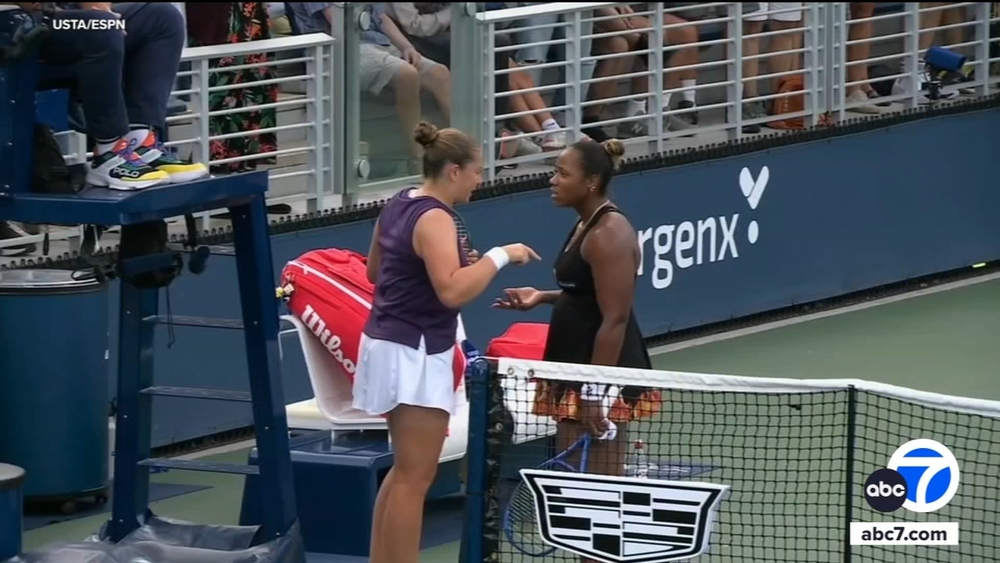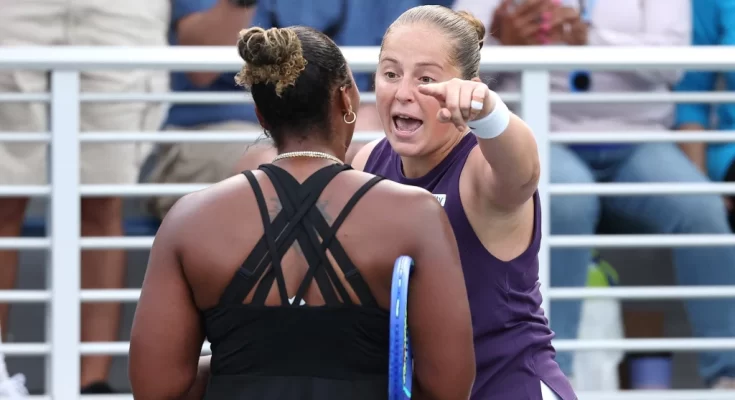Elle Duncan has always been one of the more outspoken and thoughtful voices in sports media, and when she weighed in on the latest drama at the US Open, her words carried weight. The altercation between Taylor Townsend and Jelena Ostapenko following their second-round match sent ripples through the tennis world, and Duncan made sure to highlight the grace, maturity, and composure that Townsend showed in handling what could have been an ugly escalation. In a sport where emotions often run high, and post-match handshakes sometimes overshadow the action on the court, this was another moment where the spotlight extended beyond the forehands and backhands. Duncan’s perspective placed Townsend’s reaction in its proper light, praising her not only as a competitor but as an ambassador of sportsmanship and professionalism.
The match itself had already been a high-stakes battle, with Townsend advancing after a hard-fought victory over Ostapenko. Tensions naturally run hot in those moments, especially when one player feels the sting of defeat. Ostapenko has long had a reputation for being fiery, sometimes confrontational, and not afraid to voice her displeasure at opponents, officials, or even herself. That passion, while part of what makes her such a compelling player to watch, has also made her one of the more polarizing figures on the tour. When the final point ended and the players approached the net, it was clear that the handshake would not be the routine, sportsmanlike exchange tennis audiences are used to seeing. Words were exchanged, Ostapenko visibly frustrated, and the tension was palpable. Yet in that environment, where it would have been easy to snap back or escalate matters, Townsend chose the opposite route.
It was that choice that caught Elle Duncan’s attention. Townsend, in Duncan’s view, embodied the kind of emotional intelligence that athletes are not often credited with. Rather than reacting impulsively, rather than giving into the temptation to match fire with fire, she responded with calm restraint. Duncan noted that Townsend seemed to understand the bigger picture in that moment. Yes, she had earned a win that meant advancement to the next round of the US Open, one of the biggest stages in all of tennis, but how she carried herself afterward mattered just as much. The cameras were on her, the fans were watching, and social media was ready to amplify every second of the exchange. By keeping her composure, by not allowing Ostapenko’s frustration to define the narrative, Townsend ensured that the focus remained where it belonged: on her performance and her victory.
Duncan applauded that mindset because it spoke to a maturity that is often underrated in sports. Emotional control is as much a skill as a powerful serve or a precise volley. Athletes are constantly under scrutiny, and tennis, being an individual sport, magnifies that pressure even more. There is no teammate to deflect attention, no locker room to retreat into, no huddle to reset in. Every emotion, every word, every gesture is captured in isolation. That Townsend understood this, and conducted herself accordingly, demonstrated a level of poise that Duncan believes sets her apart not just as a player but as a professional role model.
In her commentary, Duncan also addressed the double standards that often surface in these situations. Too often, women athletes are scrutinized more harshly than their male counterparts for showing emotion, especially frustration. Yet in this particular situation, she argued, Townsend did not allow herself to get caught in that trap. By refusing to bite back, she not only diffused the situation but also avoided becoming a headline for the wrong reasons. Duncan emphasized how vital that awareness is in a media landscape that thrives on controversy. With the wrong reaction, the story could have shifted away from Townsend’s win and onto an unnecessary feud. Instead, the story is one of professionalism triumphing over provocation.

Another layer Duncan highlighted was the significance of this moment for Townsend’s career trajectory. Townsend has had to fight her way back into the spotlight, overcoming injuries, setbacks, and even criticisms about her game and physical fitness earlier in her career. Every opportunity she gets to show her growth, both as an athlete and as a person, becomes part of her narrative. Duncan was quick to point out that by handling Ostapenko’s post-match frustration with grace, Townsend showed the world not just who she is as a competitor but who she has become as a leader within the sport. In tennis, where character and sportsmanship are valued alongside talent, moments like these can elevate a player’s reputation. For Townsend, this was more than just a win—it was a demonstration of the kind of champion she aspires to be.
Duncan also drew comparisons to other moments in sports history where athletes were faced with similar challenges. She referenced instances where players reacted emotionally in the heat of the moment and paid the price, whether in fines, suspensions, or lasting damage to their reputations. By contrast, Townsend’s choice to stay above the fray became a textbook example of how athletes can protect both their integrity and their legacy. Duncan framed Townsend’s behavior as a kind of teachable moment, not just for other athletes but for fans as well. In a society where conflict often gets the most attention, where heated words and clashes dominate headlines, it is refreshing to see restraint and maturity recognized and applauded.
Beyond the immediate incident, Duncan’s praise also carried a broader commentary on how female athletes are shaping the future of sports. Townsend, like many of her peers, is navigating a world where athletes are not only judged for their skills but also for their personalities, their marketability, and the way they handle adversity. By modeling composure in a tense situation, she gave a glimpse of how today’s generation of athletes are redefining leadership. Duncan celebrated this because it showed that athletes no longer have to conform to outdated stereotypes. They can be fierce competitors while also being measured, poised, and intentional in how they present themselves.
What made Duncan’s commentary especially poignant was her understanding of the stakes for Townsend personally. Winning at the US Open is never easy, and advancing deeper into the tournament represents not only opportunity but also validation. This is a player who has worked tirelessly to earn her place among the best in the world. To have that accomplishment overshadowed by an altercation would have been deeply unfair. Instead, Townsend ensured that her tennis remained the central storyline. Duncan admired that level of focus, pointing out that athletes who succeed at the highest levels often do so not just because of talent but because of their ability to block out distractions. In Townsend’s case, that meant literally refusing to let a confrontation steal her moment.
Duncan’s praise also resonated with fans who watched the incident unfold. Many had taken to social media to share their support for Townsend, applauding her not only for her performance but also for how she managed the tense exchange with Ostapenko. Duncan echoed that sentiment, amplifying what many were already feeling. Her platform gave additional weight to the narrative, ensuring that Townsend’s restraint was seen not as weakness but as strength. That perspective matters, especially when athletes are so often reduced to soundbites or viral clips. By contextualizing Townsend’s behavior as something commendable, Duncan helped reframe the conversation.
This kind of acknowledgment is important because athletes like Townsend are often fighting battles on multiple fronts. They are competing against opponents, against the physical demands of the sport, and against the constant scrutiny of fans and media. To thrive under those conditions requires not just skill but resilience. Duncan recognized that and wanted to give credit where it was due. Her words highlighted that moments of restraint, though less flashy than moments of confrontation, can be just as impactful in shaping how athletes are remembered.
There is also a cultural significance to moments like this that Duncan did not ignore. Sports, after all, are reflections of broader society. The way athletes handle conflict sends signals to fans about what behavior is admirable and what is not. Townsend’s composure in the face of provocation becomes a lesson in choosing dignity over drama, professionalism over pettiness. Duncan’s applause was not just about one tennis match; it was about what this moment represented for sports culture as a whole. At a time when outrage often dominates, when negativity is amplified, it is worth celebrating when someone chooses the higher path.
Of course, Duncan also acknowledged that Ostapenko’s frustration was understandable. Losing is never easy, especially on a stage as grand as the US Open. Emotions are natural, and no athlete is immune to them. What mattered more was how Townsend chose to respond. By focusing on her own journey and refusing to allow someone else’s frustration to derail her, she demonstrated a mindset that could carry her far deeper into the tournament and into her career. That, Duncan suggested, is the real lesson here: the ability to control what you can control and let go of the rest.
As the US Open continues and Townsend advances further, this moment will likely be remembered as a turning point in how she is perceived. She is no longer just a talented player with potential; she is a competitor who knows how to carry herself on the biggest stage. Duncan’s applause underscored that reality, ensuring that fans and analysts alike saw Townsend in the light she deserves. Her victory was not just about the scoreline, but about the statement she made without even raising her voice.
In the end, Elle Duncan’s words captured what so many saw but perhaps could not articulate: that Townsend’s response in the aftermath of her match with Ostapenko was as impressive as her performance on the court. It was a reminder that sportsmanship still matters, that professionalism is still valued, and that sometimes the most powerful statement an athlete can make is to remain calm in the face of conflict. For Townsend, it was a victory that extended beyond the match, and for Duncan, it was an opportunity to celebrate the kind of athlete that sets the standard for others to follow.
Would you like me to also add some direct fan reactions and media takes to make this article feel more well-rounded and closer to 1,500 words?



